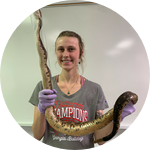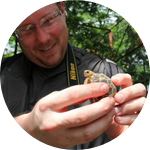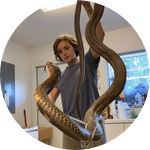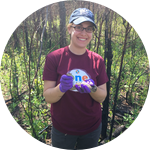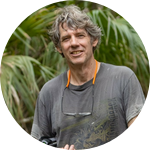About This Project
Snakes are threatened by the introduction of numerous pathogens (infectious agents) to the US. These include Ophidiomyces ophidiicola, which can cause a potentially fatal fungal skin disease (ophidiomycosis). Co-infections may increase disease severity and mortality risk. We will evaluate the health and infection status of snakes in the southeastern US through physical examinations, monthly pathogen surveillance, blood evaluations, and assessing demographic risk factors.
Ask the Scientists
Join The DiscussionWhat is the context of this research?
Ophidiomycosis was first documented in the US almost 20 years ago and has been determined to pose a threat to all snake species. Surveillance studies in the southeastern US indicate variation among species that may be impacted by natural history traits and infections with multiple pathogens. With recent concern associated with invasive parasites (e.g., Raillietiella orientialis) and serpentovirsuses, it is critical that we evaluate their impacts on wild snake populations while assessing differences between species. Elucidating differences in blood parameters and (co)infection status among a variety of snake species and demographic groups will inform management and contribute to the conservation of our snakes and ecosystems.
What is the significance of this project?
Snakes serve many fundamental roles in global ecosystems such as maintaining food webs, increasing biodiversity, and decreasing spread of zoonotic pathogens. The health of snake populations is threatened by human persecution, habitat loss and fragmentation, invasive species, global climate change, and disease. It is critical that we understand why we are observing differences in infection prevalence and disease presentation among snake species so that we can best inform conservation programs (e.g., captive rearing projects) by identifying high risk species and regions. This project will directly benefit snake conservation through active surveillance of snake health in the southeastern US.
What are the goals of the project?
Initial data collection was started in March 2022 with plans to continue monthly snake health surveys and sampling until May 2024. Six focal species will be targeted with a minimum sample size of 40 of each species of the three field sites located in GA, SC, and FL. Feces (1), blood (2), and three swabs (3) will be collected from each snake to assess for presence of seven selected pathogens of concern. Snakes will be marked using PIT tags to allow for identification of recaptures. Blood will be used for surveillance of pathogens, to assess physiological impacts of infection, and compare blood parameters in normally appearing vs. infected snakes. Pathogens will be detected using PCR methods as well as direct observation in blood and/or feces.
Budget
The developed budget was put together to cover the minimum costs to continue the on going research project for the next four months. More funds will be required to complete the research project and all support is greatly appreciated. All donations will be utilized to support the described research and therefore, snake conservation.
1. PIT Tags: Equipment necessary for permanently marking snakes with a unique identification code to allow for identification upon recapture.
2. Molecular Supplies: Extraction kits, primers and probes for diagnostic PCR tests unique to pathogens of interest. The PCR diagnostic tests will allow us to confirm the presence of the pathogens of interest and quantify the pathogen load when using qPCR.
3. Travel: Transportation costs required for field work and per diem (gas costs, per diem).
Endorsed by
 Project Timeline
Project Timeline
Trips for the necessary field work and sample collection at each field site will be done monthly until May 2024. Samples will either be processed in the field or in the laboratory with sample analysis expected to be completed by the end of July 2024. All results will be statistically analyzed and presented for publication in a peer-reviewed journal.
Jun 01, 2022
Project Launched
May 31, 2024
Finish Monthly Sample Collection
Jul 31, 2024
Complete Laboratory Analysis of Samples
Oct 30, 2024
Finalize Statistical Analysis of Data
Dec 16, 2024
Submission of Final Manuscript for Publication
Meet the Team
Affiliates
Affiliates
Affiliates
Affiliates
Affiliates
Affiliates
Team Bio
Our multidisciplinary team includes veterinary pathologists (Drs. Ossiboff and Nemeth), field biologists (Corinna, Jenna, Drs. Farrell and Cleveland), and a leading expert in ophidiomycosis (Dr. Haynes). With the resources through the Southeastern Cooperative Wildlife Disease Study, collaborations, and our field sites, the described project will be successfully and ethically executed in high merit and integrity.
Corinna Hazelrig
Corinna is a DVM-PhD student in the Comparative Biomedical Sciences program at the College of Veterinary Medicine in the University of Georgia. She graduated from the University of Georgia with her BSFR in Wildlife Sciences Pre-Veterinary Medicine. Her previous research projects focused on surveillance of Batrachochytrium dendrobatidis in amphibian species and co-infections of vector-borne pathogens in shelter dogs in the eastern United States. Corinna is now studying the comparative susceptibility of ophidiomycosis in wild snakes native to the southeastern United States and impacts of co-infections for her PhD dissertation. Corinna is co-advised by Drs. Nicole Nemeth and Christopher Cleveland.
Robert "Oz" Ossiboff
I am a board certified veterinary anatomic pathologist, virologist, and molecular diagnostician with a primary professional focus on increasing the breadth and depth of knowledge of diseases of wildlife with special emphasis on reptiles and amphibians. Through a combined understanding of the fundamentals of disease pathogenesis, pathogen biology, disease pathology, and molecular/cellular biology, I approach animal disease investigations from multiple angles in an attempt to completely characterize disease conditions. My ultimate goal is to broadly impact the health of both captive and free-ranging wildlife through pathogen research and discovery, the creation and distribution of novel reagents, and the dissemination of knowledge.
Christopher Cleveland
Chris Cleveland is an Assistant Professor with the Southeastern Cooperative Wildlife Disease Study, in the Department of Population Health at the University of Georgia College of Veterinary Medicine. His research focuses on wildlife diseases and molecular parasitology with particular foci on parasite life-cycles, transmission dynamics, and disease management and surveillance. This work also entails understanding the effects of anthropogenically driven climate and landscape change has on the epidemiology of wildlife diseases and associated vectors. Through collaborations, his research has involved Guinea worm eradication efforts among wildlife and domestic animals in Chad and Ethiopia, Africa, as well as numerous research projects throughout North America involving zoonotic helminths, vectors, and vector borne pathogens. Techniques in his lab involve field collections and laboratory methods, including classical parasitological techniques (host trapping, necropsy, proper fixation, slide making, standard microscopy), modern molecular techniques (DNA extraction, PCR, real-time PCR, and Loop Mediated Isothermal Amplification), and wildlife population techniques (spatial ecology and GPS collars, occupancy modeling and game camera data collection).
Specific areas of study include:
- Parasitic and infectious diseases of wildlife
- Vector-borne pathogens and zoonoses
- Surveillance, management and control strategies for Neglected Tropical Diseases
- Climate and landscape effects on wildlife diseases
Jenna Noel Palmisano
Jenna is a disease ecologist studying the invasive pentastome parasite Raillietiella orientalis in the United States. Snakes native to the southeastern US serve as competent definitive hosts of R. orientalis.
Jenna is starting her conservation biology Ph.D. program this fall at the University of Central Florida with the Savage Lab and received a bachelor of science degree from Stetson University. Beyond the pentastome studies, Jenna has been involved with snake fungal disease studies on the dusky pygmy rattlesnake, urban ecology projects on tiger rattlesnakes and Gila monsters in Arizona, and a herpetofauna inventory survey in New Mexico. In addition to research, Jenna has devoted her spare time to community science projects and environmental activism. She also has had the opportunity to work with herpetofauna from all over the world at the Medtoxin Venom Laboratory in Florida for several years.
Ellen Haynes
I've always been interested in science and wanted to dedicate my career to the conservation of animals and the environment. I decided to become a veterinarian to help wild animals whose lives have been negatively impacted by human actions. I received my BS in Animal Science from Cornell University in 2009 and my DVM from Cornell University College of Veterinary Medicine in 2013. After graduation, I completed internships in small animal and wildlife medicine, then worked as the veterinarian at a wildlife sanctuary for 2 years before completing my PhD at the University of Illinois in Ecology, Evolution, and Conservation Biology from the University of Illinois Urbana-Champaign. My PhD work focused on the epidemiology of ophidiomycosis (snake fungal disease), specifically investigating treatment options, host response to infection, and pathogen genomic variation. As a Postdoctoral Research Associate in the Cleveland Lab at SCWDS, I am involved in projects on Guinea Worm transmission and ophidiomycosis surveillance in the state of Georgia.
Nicole Nemeth
Nicole Nemeth is a board certified anatomic pathologist with over 20 years of diagnostic and research experience with a variety of exotic and wildlife species, including many avian species (including, passerines, raptors, waterfowl, gallinaceous birds, and others), reptiles (e.g., snakes) and mammals (e.g., groundhogs, raccoons). She is an associate professor and the head of the wildlife research and diagnostic service at the Southeastern Cooperative Wildlife Disease Study and in the Department of Pathology at the University of Georgia.
Terry Farrell
I love snake ecology and have been studying pygmy rattlesnakes in central Florida for decades. This research has lead to a series of studies on snake fungal disease (ophidiomycosis) and invasive pentastome parasites. Human transport of pathogens has led me into disease ecology. I am a professor of biology at Stetson University in DeLand where I am lucky to have many energetic students to collaborate with on our snake ecology research.
Project Backers
- 76Backers
- 100%Funded
- $2,205Total Donations
- $25.00Average Donation

